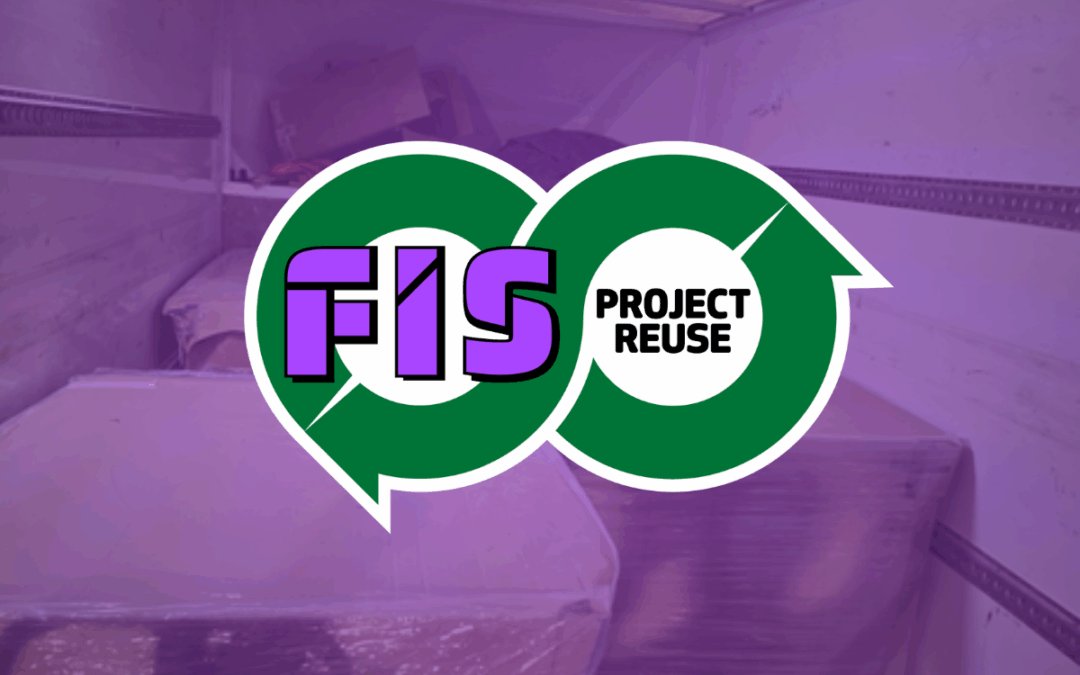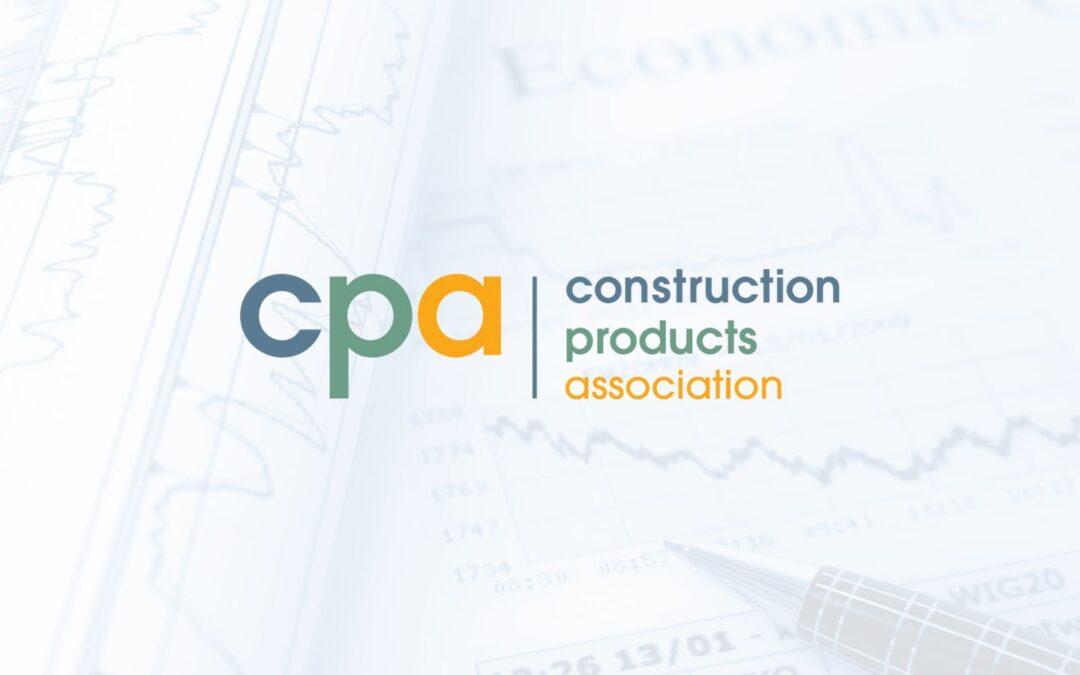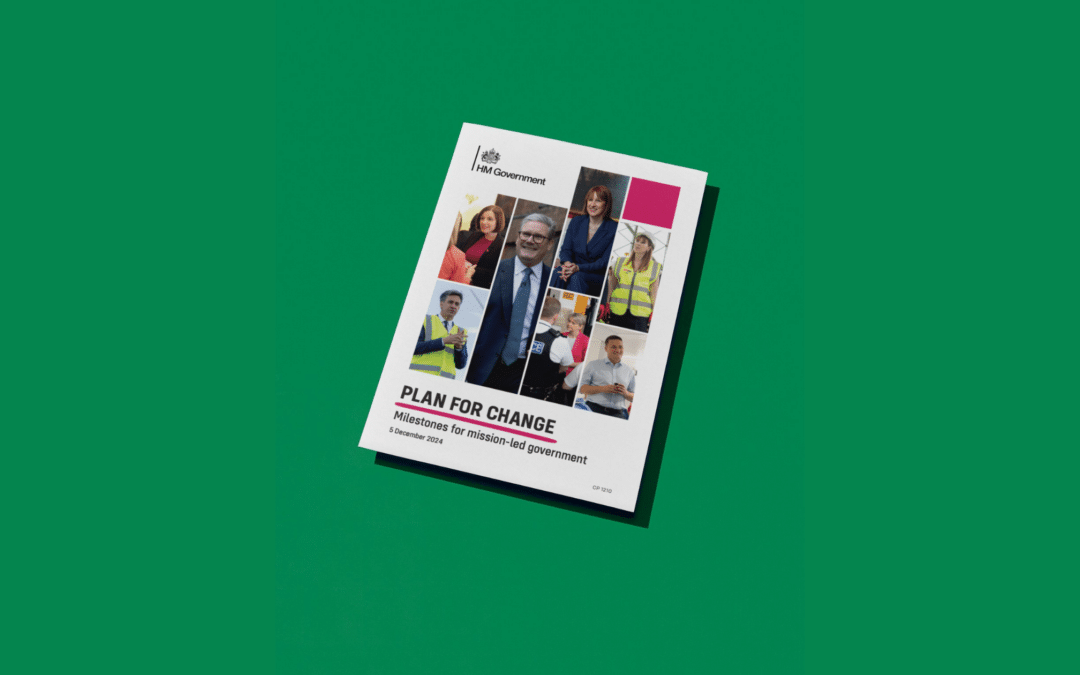
by Clair Mooney | 2 Jun, 2025 | Sustainability
Project Reuse, our innovative pilot scheme, has reached an exciting milestone with the first donated fit-out products arriving at the scheme’s East London storage facility. Designed to reduce embodied carbon emissions and waste from the commercial office fit-out cycle, the project is now proving that a scalable, practical model for reuse is not only possible but already underway.
Deconstructed by KpH Deconstruction and transported by Urban Miners, the materials are now safely stored as part of FIS’s pilot to explore the logistics, standards, and business models that will be necessary to scale reuse across the sector. With commercial office spaces refitted on average every five to seven years, there is significant potential to shift away from a linear ‘take-make-dispose’ model, towards a system where products retain their value and contribute to low-carbon construction strategies.
This initial delivery includes high-quality SAS130 ceiling tiles salvaged from a recent refurbishment project and marks a major step towards creating a truly circular approach in commercial interiors. The ceiling tiles, around 840 in number (covering 420m²), represent a value of £15,000 and an embodied carbon saving of around three tonnes of CO2. These nearly-new components, typically discarded despite being installed only briefly in Cat A fit-outs, are now being catalogued, stored, and prepared for reuse in future projects.
“There is growing appetite for reuse of products in commercial projects,” says Hattie Emerson, Project Manager at FIS. “The challenge is creating a system that gives project teams the confidence that reused products will be available, in the right condition, at the right time. The Project Reuse pilot scheme is paving the way by testing the processes and infrastructure that will make that possible.”
Lyndsey West, Managing Director of KpH Deconstruction, added
“Increasing construction material reuse requires a collaborative effort across the industry. We need to move to a point where circular practice becomes commonplace and redefines construction norms. We’re pleased to be working with FIS on this pioneering project to advance reuse and keep these quality materials in circulation.”
The donated materials were identified through a pre-demolition audit, a process which FIS is keen to see more widely adopted, particularly pre-refit. While materials often make their way to the charitable sector, commercial reuse remains a missed opportunity. This pilot aims to create the systems, standards and trust needed to embed reuse into the heart of the commercial fit-out process.
To find out more about the scheme visit https://www.thefis.org/knowledge-hub/sustainablility/reuse/ or to arrange a donation or source a reuse product contact Hattie Emerson – reuse@thefis.org

by Clair Mooney | 22 May, 2025 | Sustainability
FIS has been working closely with the Supply Chain Sustainability School for over three years now. Together they have organised several webinars to showcase the great sustainability initiatives of the fit-out sectors. Topics have included reuse, circular economy, organisational carbon reporting or modern slavery. The Supply Chain Sustainability School has a huge amount of online resources which are freely available.
A couple of years ago, FIS members helped create a short e-learning course “An introduction to sustainability”. This course is aimed at those in our sector that have no or little knowledge of sustainability, but are keen to know more. Those that attend the course can be rewarded with CPD points.
More recently, the Supply Chain Sustainability School has been working on a tool to better assess the industry’s capability in sustainability. This new assessment is based on what the company is doing in sustainability rather than their knowledge. We would like to encourage our members to use this tool. The plan longer term will be to use the tool to map our collective journey to net zero and help members benchmark their own efforts.
You can start your sustainability journey by registering with the Supply Chain Sustainability School to access lots of great resources (register here – Supply Chain Sustainability School). You can also assess your company’s capability here and calculate your organisational carbon footprint with this free tool, here: FREE carbon calculator for supply chains – Supply Chain Sustainability School
Visit the FIS Sustainability Toolkit for a full update on the work of FIS in this vitally important area.

by Oscar Venus | 28 Mar, 2025 | Sustainability
The Construction Products Association (CPA) is excited to announce an upcoming webinar featuring a special guest, the Building Safety Minister, Alex Norris MP. This virtual event will delve into the intricacies of the Construction Products Reform Green Paper and promises to be a pivotal discussion for those involved in the construction industry.
- Date: Thursday, April 3rd
- Time: 14:30 – 15:10
- Location: Online
During the webinar, CPA’s own Peter Caplehorn will engage in a dynamic conversation with Minister Norris, posing questions that have been submitted by CPA members. This is an excellent opportunity to gain insights into the government’s plans and proposals outlined in the Green Paper.
The administration for the webinar is being handled directly by MHCLG, so to get the Teams link for the webinar you will have to register with them on this link: https://forms.office.com/e/VchrYE35rS
For those who have burning questions about the Green Paper, there’s a chance to have them addressed directly by the Minister. Questions can be sent to the Ministry of Housing, Communities & Local Government (MHCLG) at constructionproducts@communities.gov.uk. Please note that the deadline for submitting questions is tight, with Monday morning being the cut-off.
Don’t worry if you can’t make it to the live session! A recording of the webinar will be made available shortly after the event, ensuring that you won’t miss out on any valuable information.
This webinar represents an important moment for stakeholders in the construction industry to engage with policy developments that will shape the sector’s future. Make sure to mark your calendars and prepare your questions to make the most of this opportunity.
FIS will also be responding on behalf of its members, and those who are not able to respond to the consultation are encouraged to use Green Paper Consultation – Questions to give responses to as many or as few of the questions as you would like, and return them to jamesparlour@thefis.org by Monday 5th May. We will then incorporate these into our own formal response.

by Oscar Venus | 30 Jan, 2025 | Sustainability
The Government has announced its priorities for the Planning and Infrastructure Bill, which will be introduced in the spring to speed up 150 major infrastructure projects and support the delivery of 1.5 million new homes over this Parliament. As part of the Government’s Plan for Change, the Chancellor has committed to the ‘smooth, speedy and rapid delivery’ of the Bill, which is key to reforming the planning system and kickstarting economic growth.
- The default answer to the development of acceptable types of schemes in key areas ‐ for example near commuter transport hubs ‐ will be ‘yes’. The current system of environmental impact assessments will also be replaced with Environmental Outcome Reports to reduce costs and delays.
- With over half of all decisions on major infrastructure taken to court, there will be just one attempt at judicial review in most cases, rather than three, and where a judge in an oral hearing at the High Court deems the case ‘Totally Without Merit’, it will not be possible to ask the Court of Appeal to reconsider the verdict.
- A Nature Restoration Fund will be established, allowing developers to pool contributions into a single fund to meet their environmental obligations, rather than on a project‐by‐project basis.
The Government has also published a working paper setting out the principles and objectives for its 10‐year infrastructure strategy, which for the first time aims to bring together a long‐term plan for the country’s economic, social and housing infrastructure. It includes a commitment to produce an infrastructure pipeline in order to give industry a ‘clear sense’ of the Government’s priorities and support investment. Decisions have already been made on a number of significant projects, including airports, data centres, energy farms and housing developments, and the Chancellor has now confirmed the Government’s support for a third runway at Heathrow and the regeneration of the Old Trafford area in Manchester.

by Clair Mooney | 22 Jan, 2025 | Main News Feed, Sustainability
FIS is pleased to be featured as one of the innovative solutions providers in the UK Green Builing Council’s (UKGBC) Trends in Sustainable Solutions Report.
Buildings are a crucial area of opportunity when it comes to environmental and social sustainability, as reflected at COP29 with the launch of the Intergovernmental Council for Buildings and Climate.
In 2024, the new Government accelerated green reforms demonstrating a strong narrative around climate ambitions, particularly in relation to new build and retrofit. Going forward the hope is this narrative crystalises into tangible and robust policies, importantly as the UK’s Climate Change Committee’s new Progress Report saw buildings emerge as a priority item on the agenda putting them in the focus for decarbonisation efforts.
However, this is a steep challenge as the industry needs to almost halve its emissions by 2030 (compared to a 2018 baseline) and decarbonise fully by 2050, while addressing other areas of sustainability, including enhancing resilience, social value, health & wellbeing, nature & biodiversity and reducing resource use. Meeting this challenge not only requires innovation in technologies, business models and ways of operating, but also increased and more strategic implementation of existing sustainable solutions.
FIS Sustainability Lead, Flavie Lowres said:
Sustainability is finally moving at pace, but it is still hard to define what needs to be done. This UKGBC report turns theory into practical applications by providing a list of example solutions/initiatives. It is great that UKGBC has picked up on our FIS Reuse Initiative – it shows we are moving in the right direction and asking the right questions.
This report summarises a range of sustainable solution trends that UKGBC has seen over the course of 2024, provides context on their use, and comments on the relevant driving forces in the UK market. The solutions discussed range from innovative new platforms and materials to transformative business models and processes. The analysis is based on engagement with innovation-focused UKGBC members (including input from UKGBC’s Solutions & Innovation Advisory Group), interviews with UKGBC topic leads, and desktop research.

by Clair Mooney | 16 Jan, 2025 | Employment, Sustainability
New commercial food waste legislation comes in to force in the UK from the end of March 2025. This is part of Defra’s simpler recycling plans that aim to improve recycling rates, simplify waste management, and benefit the environment. It means that from this date businesses with 10 employees or more will have to separate food waste from other rubbish streams. Companies must store food waste in separate bins and arrange collection by licensed waste carriers.
The new default requirement for most workplaces will be four containers:
- residual (non-recyclable) waste
- food waste (mixed with garden waste if appropriate)
- paper and card
- all other dry recyclable materials (plastic, metal and glass)
Mandatory food waste separation aims to ensure less waste food makes its way to landfill sites and is instead disposed of responsibly.






